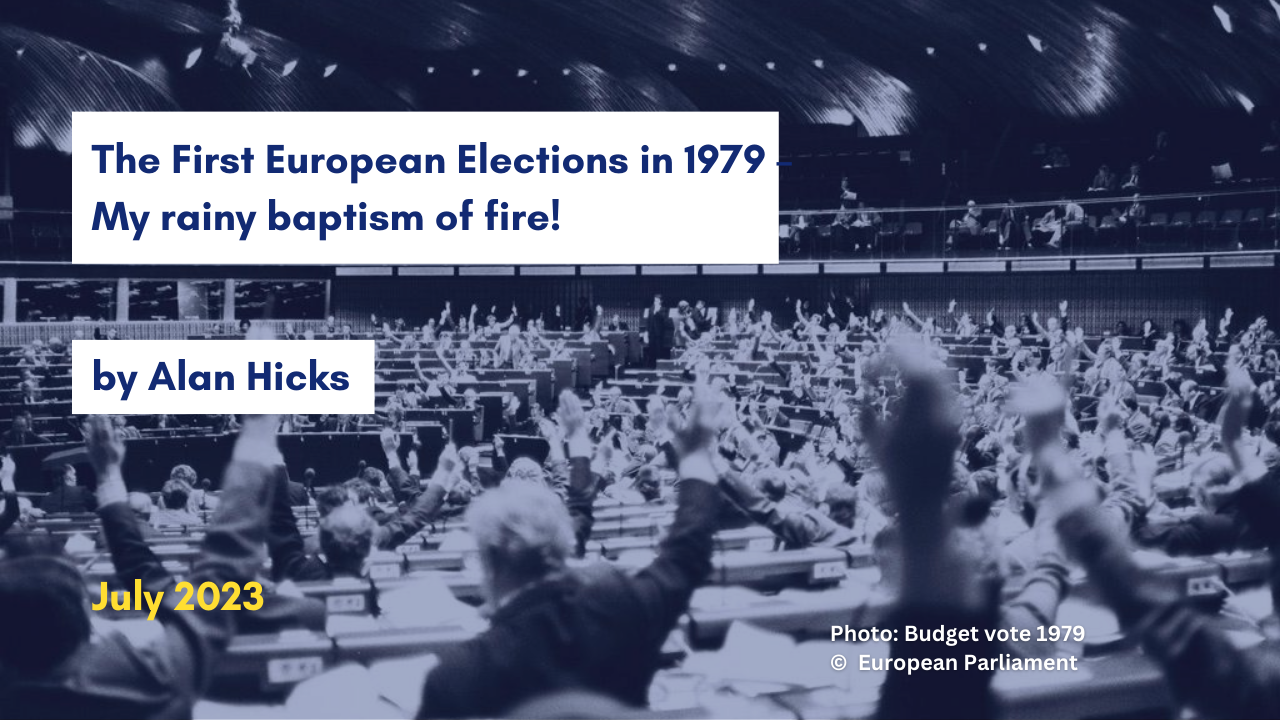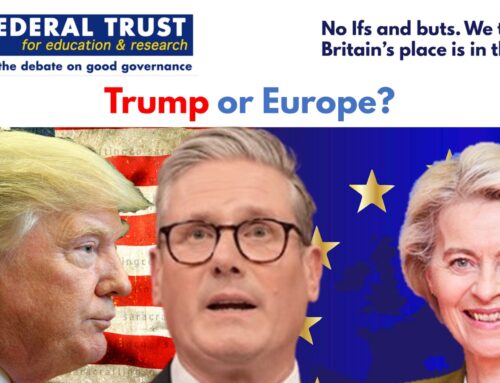 by Dr Alan Hick
by Dr Alan Hick
Dr Hick is a Board Member of New Europeans International and a former senior official at the European Economic and Social Committee
In the spring of 1979, I interrupted my studies at the European University Institute in Florence in order to campaign in the first European Elections. From Tuscany to Teesside, I put my PhD on the post-war European Movement on hold and was appointed “campaign manager” for Ernest Wistrich, newly-adopted Labour candidate for Teesside, my original home area in the industrial North-East of England. As chance or destiny would have it, Ernest was also UK Director of the European Movement and the sole federalist candidate in Labour’s 1979 European election team.
I arrived in England on 28 March 1979. That same evening the British Labour government of James Callaghan fell after losing a vote of confidence in Parliament by one vote. Unintentionally, I was now projected into a dual election campaign, national and European.
I reported to our local HQ at the Middlesbrough Labour Club on a cold, rainy Sunday. I timidly entered the smoke-filled meeting room to a warm welcome from Labour members and to hearty greetings from Ernest and from the local Council Labour Leader, Charles Edward Shopland, otherwise known as “Mr Middlesbrough”, or “Charlie” to his (numerous) friends.
Ernest had escaped Danzig just before the Nazi invasion in 1939, fought in the Polish section of the RAF and had settled in London. He was cosmopolitan and a truly committed European, with a brilliant intellect and a compelling back-story. He was also credited with having “won” the 1975 UK referendum in favour of remaining in the European Community. Like my mentor, Altiero Spinelli, Ernest intimately knew the anti-Nazi-Fascist origins of the contemporary European Idea. I felt proud to be campaigning for such a committed and qualified candidate.
Charlie, on the other hand, was a gritty, hard-nosed, soft-hearted, chain-smoking working-class veteran, originally from Wales, brought up in poverty and a Labour man to his fingertips. He was like a father-figure to me … and to most of Middlesbrough.
We quickly got down to business – first the UK elections, then the European.
Teesside was robustly Labour and our first campaign, masterminded by Charlie, resembled a crusade against Mrs Thatcher. There was a general mobilisation, solidarity and enthusiasm on the streets, at our meetings, on the doorsteps and in the polling stations. Our two local MPs – Arthur Bottomley and Ian Wrigglesworth – were returned with increased majorities on 3 May 1979, but Thatcher won most of the country.
Now the European campaign, but this time, the mood was totally different. Labour was disheartened and divided after the general election, Callaghan was toast and anti-Common Market militants started to raise their heads and divert Charlie’s attention. Our base could not be mobilised and local Labour activists were tired and sceptical about European union. I argued the case for Ernest and Europe in the Working Men’s clubs, but got short shrift. And nobody would accept our pro-European leaflets on Middlesbrough’s rainy High Street!
Ernest frantically zig-zagged from meeting to meeting, but couldn’t break the ice. Each evening, we would compose speeches and newspaper articles on the benefits of Europe for the local working community, but they gained little traction. Then, I drove him around the rural (Conservative) outskirts of the constituency, through the Yorkshire Moors down do Scarborough … in the rain, as usual. “Wistrich for Europe” our loudspeaker hailed along the bumpy route, but not even the sheep could be stirred!
We then invited European socialist “personalities” to join our policy platform. Hellmut Sieglerschmidt, a distinguished and courageous parliamentarian from West Berlin (later an MEP), with a unique insight into Europe from behind the Iron Curtain, was greeted by only three members of the public, one coming by mistake! Then, Hendrik Brugmans joined us – a member of the Dutch resistance during the war, a former Minister and founding Rector of the College of Europe (and my academic advisor). He was popular at a local Labour dinner-dance, but his fascinating history as a European federalist “pioneer” was largely ignored. (I had also hoped to invite Spinelli, but he had his own campaign to run).
Next to join us was Bob Edwards MP, a left-wing, pro-European veteran who had founded the post-war Socialist Movement for a United States of Europe and who had met Trotsky and Stalin in his revolutionary youth and had led the British contingent (including George Orwell) in the POUM during the Spanish civil war. A rather aggressive crowd turned out for his meeting, but only because he shared the platform with David Owen MP (recently Labour Foreign Minister), who was heckled mercilessly, until Bob shouted back! But by then no time was left for Bob’s radical pro-European message and his compelling political journey from Moscow to Strasbourg. I finally realised that our European campaign was starting to unravel. We retired to the Labour Club that evening, where I demolished two pints of Newcastle Exhibition and Bob (surprisingly) imbibed a few elegant glasses of gin-and-tonic!
Ernest, despite his evident qualities and clear eligibility to become an excellent MEP, never really gelled with the local Labour scene, and his numerous, positive proposals for Teesside, Europe and jobs failed to resonate. He knew the campaign was slipping away. On 7 June 1979, we went to the polling stations. They were practically empty. We lost the election to a rather unsuitable Conservative candidate and Ernest returned, disappointed and defeated, to London.
I moved on (at Bob’s suggestion) to start a traineeship with the European Parliament secretariat in Luxembourg. When I arrived for “work”, no doubt prejudiced by my rainy campaign for Europe on the sceptical streets of Teesside, I felt repelled by what I perceived as an elitist, privileged and an out-of-touch European bureaucracy and I left Luxembourg the same day. I finished my PhD and worked for another Labour MEP (from a caravan in South Yorkshire) who was later deselected for being too pro-European. I was shortlisted for the post of Labour’s European Secretary then rejected after saying “federalist” and despaired as Labour veered towards a negative policy of withdrawal from the European Community (fortunately reversed by Neil Kinnock). It would be a long, hard slog to restore hope in the European project. I met up with Spinelli again and when I finally became an EU official in December 1982, I was determined to work for Social Europe, in defiance of Mrs Thatcher. Despite my gruelling experiences of the first European election campaign in June 1979, I never dreamt that less than 40 years later, on 23 June 2016, Britain and Teesside would vote for Brexit.






Leave A Comment